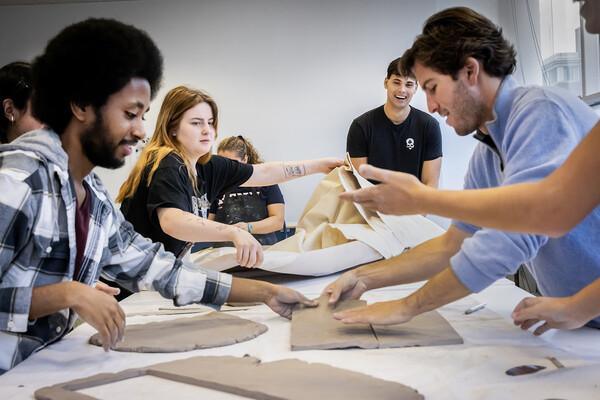Students take Philly history to the streets
If you want to see Philadelphia in all of its depth and with historic perspective, the folks at Poor Richard’s Walking Tours believe you should take to the streets. Learn about literary Philadelphia by walking the neighborhoods of important 19th century novels written here. Take a tour of North Philly to discover the black political mosaic of the 1960s and the importance of various Philadelphia civil rights leaders.
“There is a role for history in the public realm,” said Kyle Farley, history Ph.D. candidate and co-founder of Poor Richard’s. “Most historians are going to have more influence in their teaching than in their writing.”
And that’s ultimately what Farley, co-founder and history Ph.D. candidate Chris Klemek, and their nine trained tour guides do—teach everyone from native Philadelphians to students in Wharton’s Executive Education program about this important historical city.
“[Kyle and I] are always so amused by the culture of self-deprecation in Philadelphia, and we do our little bit to overcome it,” said Peter Siskind Gr’02, who is working as a guide for the fourth year.
Named for Ben Franklin’s almanac and mostly staffed by second- or third-year history Ph.D. candidates, the Poor Richard’s tours range in subject matter from a general, three-hour, 300–year tour, to one on human rights struggles in the city.
Though they now have clients such as visiting travel writers, vacationers and new Penn resident and graduate advisors, Farley and Klemek began modestly. In 1998, so influenced by the tour given to them by then-Ph.D. student Steven Conn Gr’94, Farley said he and Klemek had the “naiveté and the hubris to think we could do that.” For their first tour, Farley and Klemek said to each other, “Let’s learn it all,” and planned a driving tour of the city.
On the day of the tour, their bus reservation was cancelled, so Farley scrambled to rent a car. He doesn’t drive, and Klemek wasn’t old enough to rent a car, so their first tour was, as Farley describes, a disaster. Since then, the scholars have gotten more comfortable giving interesting tours with distinct themes.
When he arrived at Penn, colonialist Farley said he planned to focus on New England and not the middle colonies, because of the understood importance of Boston in colonial times. “As I started giving these tours and arguing the primacy of Philadelphia, I realized I was convincing myself,” he said. “Philadelphia figures very prominently in my dissertation.”
Farley said that they are focused on introducing people to public history, rather than turning a profit. His dream: To have Ph.D. students 20 years from now give walking tours of Philadelphia.
For Anne Casey, a third-year Ph.D. student, giving tours since the spring of 2003 has influenced her teaching style—you can’t teach colonial history in Philadelphia without getting out and looking at it. “You learn more every time you give every tour,” she added. “It’s kind of rewarding.”
Siskind said that he is “deeply entrenched” in Philadelphia, partly because after giving tours, he now knows so much about it. “It effects how I teach,” he added. “I’ve become much more sensitive to how alerting students to the built-in environment around them is a nice fun user-friendly entrée into other issues.”
For more information on Poor Richard’s Walking Tours, visit their web site, phillywalks.com.







